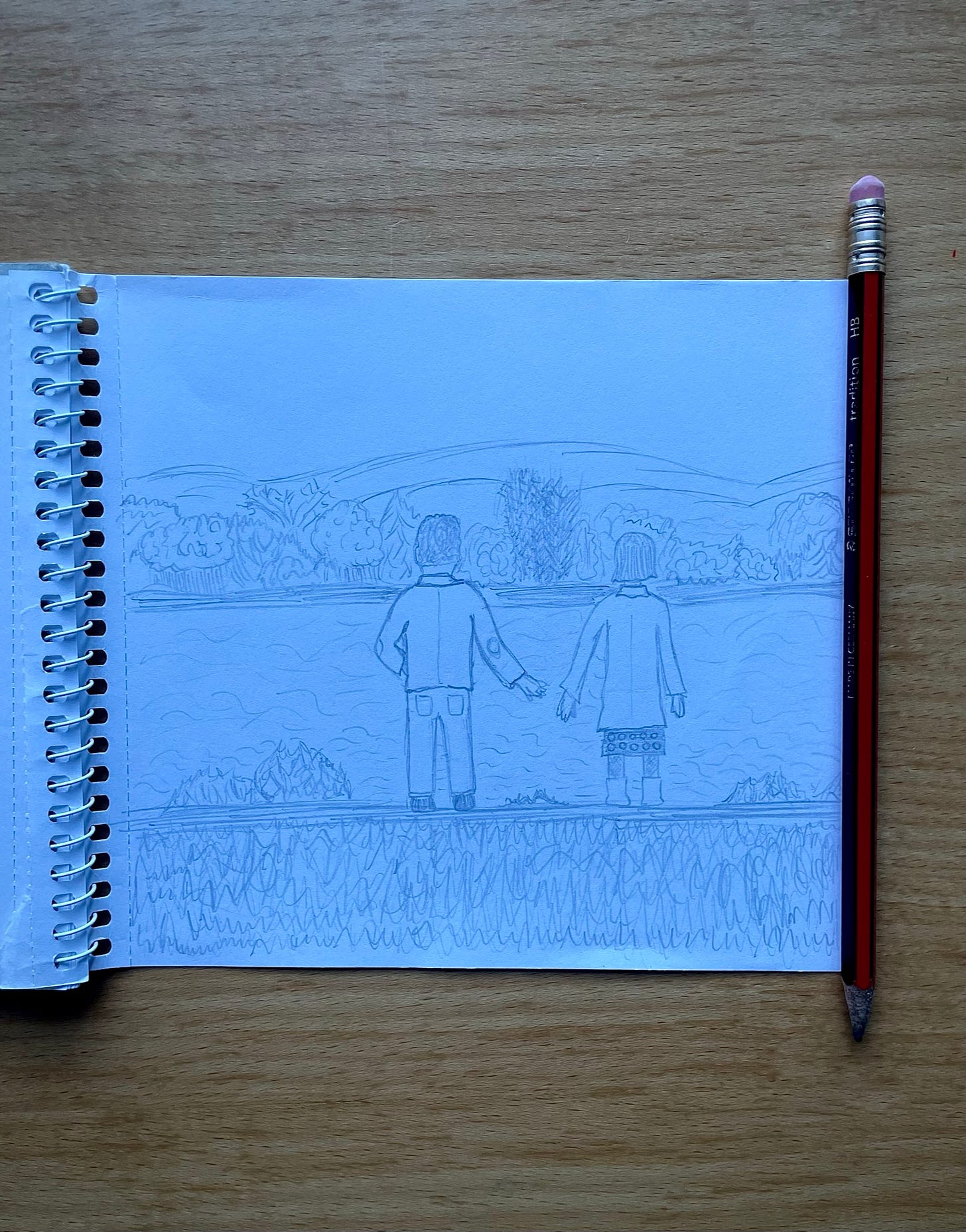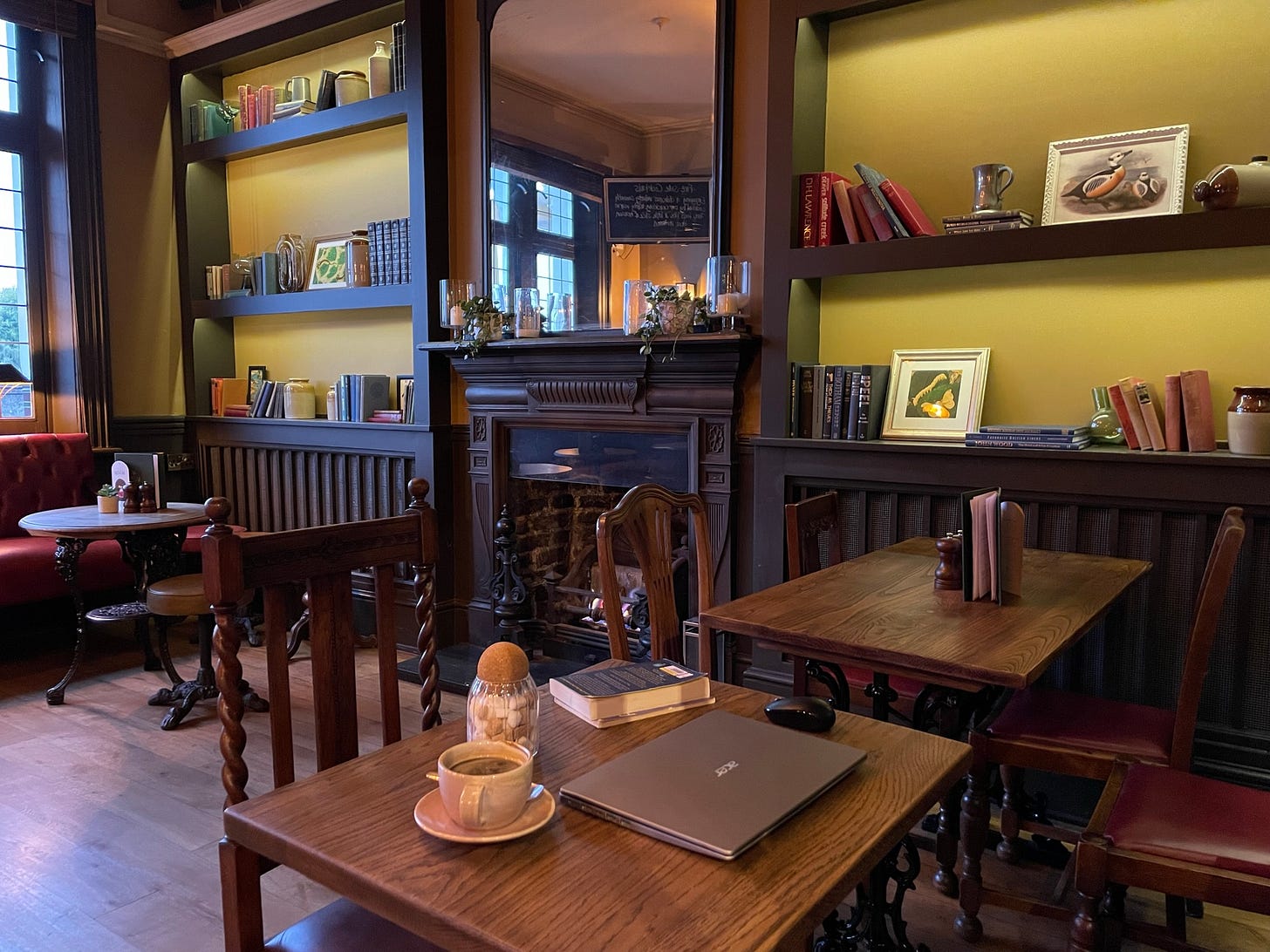From Idea to Stage in 10 Weeks | Issue 6 | Into the Director's Chair
Documenting the process of planning, writing, editing, staging, and now directing a short play in just 10 weeks
💡 This article explains how and why I’ve ended up directing my first ever play, and how I approached the challenge.
I’ve had a very difficult time over the past couple of weeks, so unfortunately I have to apologise again for behind schedule with these articles.
I won’t go into any more detail than that. But this means I’m going to skip an article in this series for now. Next up should’ve been about how I edited my script to refine and finalise the story over the middle weeks of the programme, but I’ll have to retroactively publish that at a later date.
Why is that?
Well, because something really significant and exciting has happened on the Writers’ Studio programme recently, and I want to start telling you about that now while it’s still ongoing.
From Writer to Director
If you’ve been reading this series from the beginning, you’ll know it’s a way for me to share my experience of planning, writing, editing, and staging a short play in just 10 weeks. That’s all part of the awesome 2024 Writers’ Studio programme at the OSO Theatre in Barnes.
As it turns out, the writing part of the programme was actually just seven weeks. We had to finish our scripts by the seventh week, then hand them over to the director and actors to rehearse for three weeks before the big event on Sunday, November 17.
I’ve written a lot of short stories over the past few years, and I have some pretty effective processes and frameworks for doing that. So, I was able to write a strong 10-minute play that I was very happy with in around five weeks, leaving a lot of time left to think about how it would be staged.
To be brutally honest, that writing process wasn’t a huge challenge for me, as it’s something I do regularly already.
Yes, writing a play instead of prose was a great learning experience, and I’m so glad I decided to join the Writers’ Studio, but as an experienced writer it didn’t push me quite as far outside my comfort zone as I’d hoped.
I really wanted to take something completely new away from this experience, and it recently became clear that directing the play myself — whilst simultaneously learning how to direct — could be the answer.
And since the plays are only 10 minutes long, featuring only two actors, it was actually the perfect opportunity.
So, around week six, I decided to ask the programme leader if I could direct my own play and, to my pleasant surprise, she said yes.
Why Ask to Direct When You’ve Never Directed Before?
I want to quickly make it clear that in no way was I undermining or diminishing the art of directing a play.
I understand that is an extremely complex and specialist skill that many people study half their lives to become good at, and I wasn’t taking the challenge lightly.
However, in addition to the motivation mentioned above, there were some specific reasons why I felt like it was the right decision for me to direct this particular play myself.
A Natural Step
Directing is actually something I’ve always wanted to do. I studied film at A-Level, and as part of my undergrad. degree, and have continued to study it in my spare time throughout most of my adult life.
I do feel I have an above-average understanding of what’s involved in directing, even if my focus has been more on film than theatre.
As a side note, I actually considered making the story I’ve told in this play as a short film around this time last year. Here’s a sketch from last year of the closing shot I’d intended for that film.
I’m also a very visual thinker, and I’ve always loved to draw. Without even consciously realising it, I’d already started sketching the scenes of my play and storyboarding it all out around the third week of the programme.
So, naturally, I was already thinking about the staging, the physicality of the actors, the mannerisms of the characters, the blocking, and how the story should be told on-stage, very early in the process.
After the first few weeks, I could already visualise the entire performance, and it wouldn’t have felt right handing that over to someone else while I had such a clear vision of my own.
Prioritising Character
I believe that whatever medium you’re working in — whether it’s a play, a novel, a film, or something else — the fundamentals of effective storytelling remain the same.
While I have no experience in theatre, I’m aware that one of the most important aspect of directing a play is helping the actors understand the characters so they can portray them well.
Interestingly, my approach to writing short stories is to prioritise character. I think you’ll usually stand the best chance of capturing and retaining the attention of your readers, and evoking an emotional response from them, by creating relatable, compelling characters that they connect with and become invested in.
With that in mind, the bulk of the work I did in planning my play was focused on the characters’ goals, desires, motivations, insecurities, conflicts, relationships, etc. Basically, all the things a director will need to prioritise when working with their actors.
So, not only did I have a very clear vision of how the play should be staged, I also had a very specific understanding of what the actors would need to do find the best possible portrayal of those characters.
It didn’t make sense to try to pass that understanding on to someone else, so I felt like the best person for the job.
How I Approached Directing a Play as a First-Time Director
Normally when learning how to do something for the first time, my approach would be to sit down and research how to do it first.
But in this case, as mentioned, I already had a vision for how it should be done. I also had a lot of ideas about working with the actors.
So, I couldn’t resist planning out my approach and my first rehearsal before doing any research, even though I knew I’d have to adjust those plans if my research showed me I was on the wrong track.
Thankfully, when I sat down to finally do my research, it was really gratifying to find that everything I’d planned intuitively was aligned with what the experts advised. All the ideas I’d had for how to approach directing and working with the actors were right.
Prior to that, I was confident, but I wasn’t sure if that confidence was justified or if it was just blind arrogance.
But after doing the research and finding all my instincts were correct, it was one of those moments where you prove you had a right to be confident all along, which is a great feeling.
So, how did I actually approach it?
Here are some of the key things I planned or noted to myself, then found to be along the right lines in my research, while preparing to direct a play for the very first time:
The writing, the story, the text, are the priority. Everything else comes after that. The director’s job is to take the script and tell that story effectively through the actors’ performance, but the writer should be able to advise on how that’s done based on what they’ve written. So, a director’s first step should be to work with the writer to understand what the play is really about.
Keep the process of working with the actors collaborative, open, and exploratory. Ask for the actors’ opinions and perspectives regularly, and be willing to take their ideas on board.
Clear communication is absolutely critical at all times. Make sure you’re explaining everything clearly, don’t use vague terms, give relatable examples, give the actors plenty of opportunities to ask questions, and ask follow-up questions of your own to ensure everyone understands what you mean.
Ensure you’re 100% clear on how your characters think and feel in each moment of the story, and why. You should be able to answer questions and explain this in detail every step of the way. You need to fully understand your characters’ backstory, goals, motivations, emotions, insecurities, relationships, conflicts, and everything else that influences them within the story.
Actors are very emotionally intelligent and creative. They don’t need rigid, overly-detailed instructions, they just need suggestions and prompts. Help them understand how the characters feel, and why, then let them explore their own ideas for how to portray that.
Play to the actors’ strengths and lean into the connections they find with the characters, rather than trying to force things that aren’t working.
Ensure what’s happening on stage is emphasising what’s happening in the story, both within the characters and between the characters.
Obviously, there’s a lot more important research and preparation that went into it, but those are just some of the key reminders I gave myself before beginning to direct the play.
And I must reiterate that these are very simple, short plays at a fringe theatre. I’m not putting on a big, complex production at all. But that’s exactly why I felt this was the perfect opportunity for me to try directing without any previous experience.
I’m also very fortunate, because I’ve got four other experienced directors around me directing the other plays, who I can lean on for technical support as and when I need it.
In the next article, I’ll share more detail about how I planned and ran the actual rehearsals, what they involved, and so on.
In the mean-time, for anyone reading this with experience in theatre, I’d love to hear your thoughts and feedback on this in the comments.
A Great Review Already
For the past seven years, almost everything I’ve written fiction-wise I’ve shared with my writing group for feedback, and I’ve used that feedback to help me edit.
I think I’m especially proud of this play because it’s the first story I’ve written in eight years that I haven’t shared with that group.
Admittedly, I did receive some small bits of feedback and input from the other writers on this Writers’ Studio programme, but it’s been pretty much all my own work, including the editing process.
I did share one of the later drafts with a friend from my writing group just to let her read it, though, and she provided this very generous review.
This Week’s Sunset of the Week
A couple of weeks ago, I was sat in The Bull’s Head in Barnes opposite the Thames on a Monday evening, writing an article, waiting for our Writers’ Studio workshop to start.
I looked up from my laptop to see a bright orange sky out the window, and I had to immediately pack up my stuff and leave to watch this sunset.
Sometimes, you just have to stop what you’re doing and admire things like this for a few minutes.
This was actually quite surreal, as it brought a weird feeling of calm over the whole area. All the cars on the road slowed down to a crawl, and dozens of people lined up along the river, interrupting their journeys home from work to watch it.
This was one of the best sunsets I’ve ever seen in the UK.
Sadly, a phone camera could never do it justice.
Where Are We This Week?
Continuing my experiment of sharing some of the interesting places I go to work sometimes, here’s the pub I just mentioned above. I wasn’t technically writing this article while there, but it links very nicely with the sunset for once!
This Week’s Song on Repeat
This week, a very old, very quirky, very good cover.





